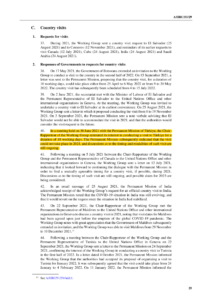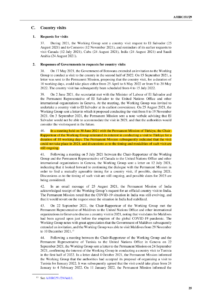Turkey has refused to allow an official visit of the UN Working Group on Arbitrary Detention, which had ruled in recent years against the government of President Recep Tayyip Erdoğan in multiple cases of violations of the UN rules on human rights that Turkey, as a member state, is obligated to abide by, Nordic Monitor reported.
According to Abdullah Bozkurt’s story, the group has been trying to get permission and schedule a date for an official visit since November 2016 against the backdrop of mass arbitrary detentions in Turkey that have targeted critics, opponents and dissidents with blatant abuse of the criminal justice system.
Alarmed at the scale and magnitude of detentions in 2016, the working group officially filed a request to pay a visit on November 15, 2016 under the mandate provided to the UN by the Universal Declaration of Human Rights and the International Covenant on Civil and Political Rights, to which Turkey is a party.
The Erdoğan government simply ignored the request and acted as though the letter had never existed.

UN officials sent a reminder to Turkey on November 8, 2017 asking the Erdoğan government to respond to their year-old request. Turkey ignored the second letter as well. On March 6, 2020, the UN sent another reminder but received no response to that, either.
The Erdoğan government kept ignoring letters until the COVID-19 pandemic appeared, causing the death of millions and disrupting international travel. Then, in a quick change of heart in November 2020, when most countries had shut their borders, Turkey informed the UN that it was agreeing to the visit of the working group, knowing full well that no such visit could take place under pandemic conditions.
As expected, the working group requested to postpone the visit until the pandemic risks disappeared. A new request for a visit before the end of 2021 was conveyed to Turkey’s Permanent Mission at the United Nations by the group’s chair at a meeting on June 30, 2021 with Turkish diplomats. This time, Turkey rejected the request, saying that no such visit could be arranged for 2021 without offering a reasonable explanation for the postponement.
The exchange of communications has been ongoing since then.
According to UN records, the last visit to Turkey by the working group took place 16 years ago, in October 2006. Although Turkey is one of the member states that extended a standing invitation to UN investigators and experts, that policy was not followed in the case of the Working Group on Arbitrary Detention.
In recent years the UN group has found multiple arbitrary detentions in many cases submitted to the UN. Some of them involved members of the Gülen movement, a group that has been critical of the Erdoğan government and has been the main target of persecution, with hundreds of thousands of its members detained.
In 2020 the UN Working Group on Arbitrary Detention found that the deprivation of liberty due to Gülen links of three individuals was arbitrary, lacked a legal basis and violated the Universal Declaration of Human Rights and the International Covenant on Civil and Political Rights.
The last visit request by the UN Working Group on Arbitrary Detention in 2021 was rejected by the Turkish government:

t further held that those with alleged links to the Gülen movement were being targeted on the basis of their political or other opinions, constituting a prohibited discriminatory ground. The opinion concerned three Turkish nationals — Abdulmuttalip Kurt, Akif Oruç and Faruk Serdar Köse — who were arrested by Turkish authorities on charges of membership in the Gülen movement.
In its opinion the working group called on the Turkish government to immediately release the complainants and accord them compensation, also urging the government to take urgent action vis-à-vis the threat posed by the coronavirus global pandemic in places of detention.
“The Working Group considers that, taking into account all the circumstances of the case, the appropriate remedy would be to release Mr. Kurt immediately and accord him an enforceable right to compensation and other reparations, in accordance with international law,” the opinion stated.
President Erdoğan began to target followers of the Gülen movement after two corruption investigations became public knowledge on December 17 and 25, 2013, which implicated him, four of his ministers and other prominent figures from his government or support base. Accusing the movement of instigating the investigations, Erdoğan designated the movement an armed terrorist organization and seized all Gülen-affiliated media outlets, private lender Bank Asya and businesses partially or wholly owned by people affiliated with the movement.
After a false flag coup in 2016, Erdoğan intensified his crackdown on the movement, locking up hundreds of thousands of people affiliated with the movement and seizing their assets.
The Turkish government accepted such activities as having an account at Bank Asya, holding an administrative position at a Gülen movement-linked institution, subscribing to the Zaman daily or other perceived Gülenist publications, being a member of a trade union or other institution linked to the Gülen movement and using the encrypted messaging application ByLock as benchmarks for identifying and arresting tens of thousands of followers of the Gülen movement on charges of membership in a terrorist organization.
According to the UN working group none of those activities in itself could be construed as a criminal act but rather as the peaceful exercise of rights granted under human rights treaties.
“However … none of those activities in itself could be construed as a criminal act, but rather as the peaceful exercise of the rights protected by the Covenant and the Universal Declaration of Human Rights. Notably, the Government has not indicated that any of these actions by Mr. Kurt were violent or incited others to violence. In fact, there is nothing in the Government’s response that would indicate that all these actions were something other than the peaceful exercise of Mr. Kurt’s rights under the Covenant, including his rights to hold opinions and to freedom of association,” the group said.
“[I]t is clear to the Working Group that, even if Mr. Oruç did use the ByLock application, it would have been merely in exercise of his freedom of opinion and expression. Those rights, as defined in article 19 of the Covenant, constitute the foundation of every free and democratic society.”
The working group further found that those with alleged links to the Gülen movement including the complainants were targeted on the basis of their political or other opinion which is a prohibited discriminatory ground.
“The present case is the latest case concerning individuals with alleged links to the Hizmet [Gülen] movement that has come before the Working Group in the past two years. In all these cases, the Working Group has found that the detention of the individuals concerned was arbitrary, and it appears that a pattern is emerging whereby those with alleged links to the Hizmet movement are being targeted on the basis of their political or other opinion. Accordingly, the Working Group finds that the Government detained … on the basis of a prohibited ground for discrimination …”
Noting a significant increase in the number of cases brought before it concerning arbitrary detention in Turkey in the past three years, the working group expressed its grave concern at the pattern that all these cases follow and urged the government to implement its opinions without further delay.
In 2021 the group found similar violations in complaints filed by victims who were affiliated with the Gülen movement.
The arbitrary detentions are not confined to Turkish citizens. The Erdoğan government has also detained a number of foreign nationals in recent years in what is seen as hostage diplomacy to extract concessions from other countries. The detentions prompted the US State Department to at times warn American citizens against travel to Turkey for several reasons including arbitrary detentions in the country.
In 2018 travel advisory the State Department said, “The Government of Turkey has detained and deported US citizens without allowing access to lawyers or family members, and has not routinely granted consular access to detained US citizens who also possess Turkish citizenship.”
